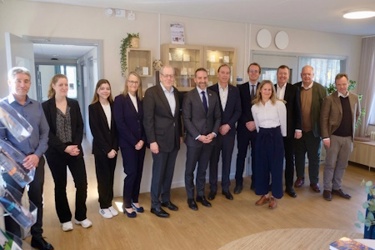Global Trade Tensions Turn Spotlight On Swedish Innovation

The Canadian feed company Friesen Group has expanded its collaboration with Swedish environmental company Ragn-Sells and its innovation subsidiary EasyMining. EasyMining’s technology for recovering the key nutrient phosphorus from sewage sludge has attracted strong interest in Canada, where the ongoing tariff conflict with the US is pushing Canada to build a more resilient economy.
“To manufacture animal feed, we need phosphorus – but supply is uncertain, since a handful of countries control the world’s phosphate mines. Many deposits also contain high levels of hazardous heavy metals. Gaining access to clean, recycled phosphorus from domestic sewage is a fantastic opportunity for us,” says Friesen Group CEO Marvin Friesen.
Phosphorus is one of the key nutrients in both mineral fertilisers and animal feed. Ragn-Sells’ innovation company EasyMining has developed a method to recover over 90 percent of the phosphorus in the ash from incinerated sewage sludge. The technology enables replacing imported, mined phosphorus with recycled phosphorus. Ragn-Sells is currently constructing the first two production facilities in Helsingborg, Sweden, and Schkopau, Germany.
Canada has no domestic phosphate mines and is entirely dependent on imports, primarily from the United States. For the country’s large agricultural sector, long-term and secure access to phosphorus is crucial to both the economy and food security.
“If phosphorus gets drawn into the ongoing series of tariffs and countermeasures, prices could increase by 25 percent. There is also an obvious risk that exports from the US could be restricted. That would put us in a very difficult position,” says Mr. Friesen.
During a visit on 21 March to EasyMining in Uppsala, the companies decided to expand their partnership. In addition to supplying Friesen Group with recycled phosphorus from the two facilities now under construction in Sweden and Germany, the companies are also exploring the possibility of building local phosphorus recovery plants in Canada in the future. Jason LaTorre, Ambassador of Canada to Sweden, who was also in attendance, warmly congratulated the companies for their deepening cooperation. He underscored the strategic importance of the technology and the contribution it will make to Canada’s resilient and sustainable economic growth.
“Access to phosphorus is becoming a strategic and geopolitical issue, which Canada has clearly recognised. For a farming country like Canada, restricted phosphorus exports from the US would be a disaster,” says Pär Larshans, Chief Sustainability Officer at Ragn-Sells Group.
Canada, unlike the EU, does not ban the use of recycled phosphorus from sewage sludge in animal feed. The EU ban dates back to the BSE crisis (“mad cow disease”) and does not account for the new technologies that now make safe phosphorus recovery possible.
“This technology can play a vital role in both the EU’s and Canada’s strategic security. However, as long as recycled phosphorus is banned in feed within the EU, there’s a risk the technology will move elsewhere. That could mean the EU misses out on a future billion-euro industry and the chance to improve its food security,” says Pär Larshans.
About Ragn-Sells Group
The environmental company Ragn-Sells converts waste into raw materials that can be used over and over again. Ragn-Sells drives the transition to a circular economy through solutions that reduce its own and other actors' environmental and climate impact.
Ragn-Sells is a family-owned corporate group founded in 1881. The company operates in four countries and employs over 2,500 people. In 2023, Ragn-Sells’ turnover was SEK 8.5 billion. For more information, visit www.ragnsells.com.
Source: Ragn-Sells Group
